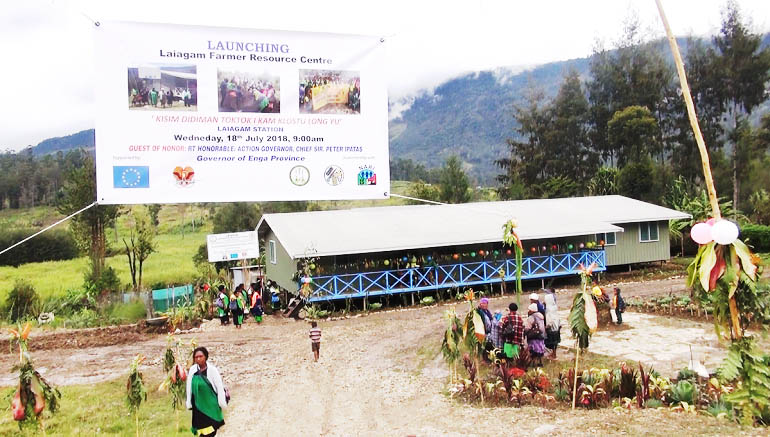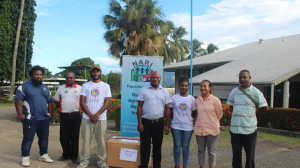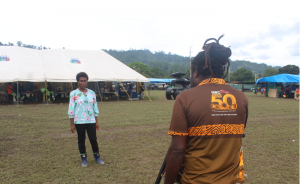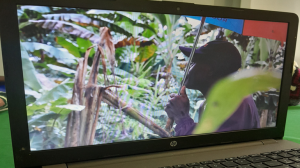Effective sharing of knowledge is an essential building block for resilience among vulnerable farming communities. The challenge in Papua New Guinea (PNG) is more about how to best provide ideas generated through research so that they are very accessible for farmers use. The National Agricultural Research Institute (NARI) is exploring different ways to improve the reach and impact of appropriate agricultural technologies and information among farmers. One of these is the use of resource centres to bring agricultural information and knowledge closer to farmers.
From years of trialing the concept, NARI is now encouraging provincial authorities and other organisations working with rural communities to establish resource centres. It is hoped that these centres would drive support needed to boost growth in agricultural productivity and resilience to extreme climatic events, at the community level.
Resource centres could be in buildings, shared spaces or portable platforms. Their role is not only limited to providing information. They can also serve as points for distributing planting materials and livestock, and places where farmers can share ideas. Respective provincial Department of Agriculture and Livestock (DAL) or Department of Primary Industry (DPI) will operate these resource centres at strategic provincial and district locations.
Through the main resource centres, provincial authorities will collaborate with satellite centres in rural districts to enhance the delivery of agricultural information packages. Satellite resource centres would include those established under a recently ended project with European Union as well as those run by churches and other relevant community-based stakeholders.
Farmer learning activities at resource centres create opportunities for information and climate-smart technologies to be disseminated to vulnerable communities. We are now scheduling ‘training of trainer’ workshops to support outreach programmes of provincial DAL and DPI offices. Topics feature aspects of improved farming, post-harvest and basic agri-business management practices.
Examples of these include planting material multiplication methods, soil management, disease control and post-harvest processing. These collaborations can take advantage of partnerships between existing resource centres and various development agencies. In Enga province, West Enga Women in Agriculture (WEWiA) farmer group from the Laiagam resource centre has been undertaking training programmes with the support of the provincial Department of Primary Industry, since 2018.
Community-based organisations such as the Laiagam District Council of Women; Pogera Resident Women Association; and Christian Apostolic Church have partnered with WEWiA. This support has enhanced the capacity of WEWiA to respond well to increased interest for disease free (pathogen tested) sweetpotato and Irish potato seed materials. Collaborations between relevant stakeholders would increase the chances of disseminated information and technologies being adopted.
Besides training workshops, provincial agricultural authorities can also use resource centres to stage agricultural field day exhibitions. Demonstration fields can be used to stage hands-on trials with participants. Participating farmer groups could also be encouraged to share the successes they have had with introduced technologies they have adopted or adapted.
Resource centres can be used to provide electronic media facilities for rural farmers. Initial efforts to realise this were made through installations of multimedia facilities under the second phase of the European Union funded rural economic development project.
This offers the possibility of real time exchanges of information through the network of resource centres, farmers and service providers. Social media access is also possible through platforms like the email and Facebook. These would enhance the potential for information to be widely circulated and adopted among rural farming communities.
Use of multimedia platforms creates the opportunity to use audio-visual information packages. Provincialagricultural authorities can take advantage of this by developing their own multi-media materials. They could also adopt some videos of our released farming innovations.
A survey found that videos about raising village chickens; seed multiplication and post-harvest food processing were more popular among people. It is anticipated that videos would be part of the entries that will be shared on internet platforms such as the NARI website and Facebook page.
Presently, work has begun on the production of videos and a mobile App to make these materials more accessible. These activities are undertaken with support from the European Union.
The use of resource centres creates an ‘enablingintervention’. It is a response to the call of the National Agricultural Development Plans to produce and disseminate relevant agricultural information for ‘Agricultural Research, Information and Training (Extension)’ among farming communities.
There is also opportunity toimprove and strengthen human resource development in the agricultural sector. This can be realised through capacity building to enable increased participation of women and youths in agricultural development programmes, across the provinces.
A recent report by the Business Council of PNG has stated that effective communication between the government, the business sector and the general population is needed to enable all stakeholders to be fully informed and engaged in the development of the country.
We hope to contribute meaningfully towards this vision by utilising resource centres, and other strategies, to improve dissemination of farmer-friendly agricultural information packages.




